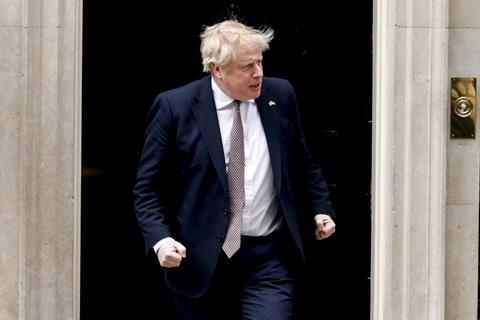We could be witnessing the downfall of this government, says Danny Webster, as he argues that regardless of whether Boris Johnson’s breaking of the rules was accidental or deliberate, it constitutes a significant failure of leadership

With confirmation that Boris Johnson, along his wife and Rishi Sunak, have been issued with Fixed Penalty Notices for breaches of Covid regulations there are now only two plausible options for what happened.
Either they knew what the rules were and broke them deliberately, or were unaware of the rules they were passing and considered their gathering within the rules.
I’m not sure what’s worse. Either the Prime Minister knowingly misled parliament when he insisted that regulations and guidelines had been followed at all times. Or he misled the public (and himself) about the consequences of the rules the government were passing.
What has often been glossed over is that in the summer of 2020 the celebrations for Boris’ birthday were covered in The Times, without any hint that they were against the rules. While the militancy of the regulations meant friends carrying cups of coffee on a walk were considered to be too leisurely to be exercising, there was an acceptance that some people did need to be in the same place as others for work. It would seem as though the complacency in Downing Street emerged from not feeling the force of the restrictions in the way that most of the country did.
The different events in Downing Street that have been exposed in recent months vary from those that posed little increased risk and the participants probably viewed as within the course of the daily work (the birthday gathering probably comes into this group) and others where leaving by the back door was an effort to evade scrutiny after wheely suitcases had been taken to the local Co-op to stock up on wine.
there is surely no future as the leader of the country for someone who deliberately breaks the law
The problem is not that there was any greater health risk from these gatherings. The problem is that the people who made the rules broke the rules. And whether they did knowingly or not only determines which problematic explanation is true. If they did so deliberately it requires little further comment, there is surely no future as the leader of the country for someone who was party to such choices?
But I would suggest that to do so accidently is just as significant a leadership failure. The Covid regulations were an unprecedented infringement of liberty, justified by the particular threat of the virus and the lack of information about how it spread, how to restrict it and how dangerous it was. In those circumstances most people accepted the lockdown as necessary. But from the early days of the novel legislation questions were asked about how the actual laws didn’t match up with the guidance put out to the public on how to follow them – for example the law never restricted how many times a day you could exercise, but the guidance said you could only go out once. Police were over-zealous in their enforcement of rules, as well as viewing coffee cups as aiding and abetting a crime, travelling too far from home also warranted their intervention.
Therefore the opening words of The Times article on 20 June would set the scene for this now notorious criminal event: “Boris Johnson celebrated his 56th birthday yesterday with a small gathering in the cabinet room. Rishi Sunak, the Chancellor, and a small group of aides sang him Happy Birthday before they tucked into a Union Jack cake.” There was clearly no sense at this stage that this gathering broke the rules. I say this not to excuse the gathering, but to condemn the legislation that meant they, the journalists, and the readers, did not (apparently) know what the laws passed meant.
It would be too easy to excuse the poorly understood policy on the challenges of the times, the need for emergency legislation, and the lack of time for full scrutiny. Unfortunately the processes did not improve in the months and then years that followed as mountains of legislation and amendments were issued with minimal parliamentary scrutiny. And the habit of unwieldly legislation is one that this government doesn’t seem able to kick. Huge pieces of legislation currently going through parliament often with much of the detail delegated to ministerial decisions at a later date, inadequate time for scrutiny, members of the House of Lords staying until the early hours to debate amendments to improve these laws, only for the Government to summarily reject them.
It may be that we are witnessing what may trigger the downfall of this government, although I wonder if so much erosion of trust has already been accepted that this latest episode may too be ridden out. But more than a change of government we need a change in how governments act. We need better legislation, and better engagement in parliament so laws are clear, implications are widely understood and decisions are made in the clear light of day, and not just because something must be done.





































